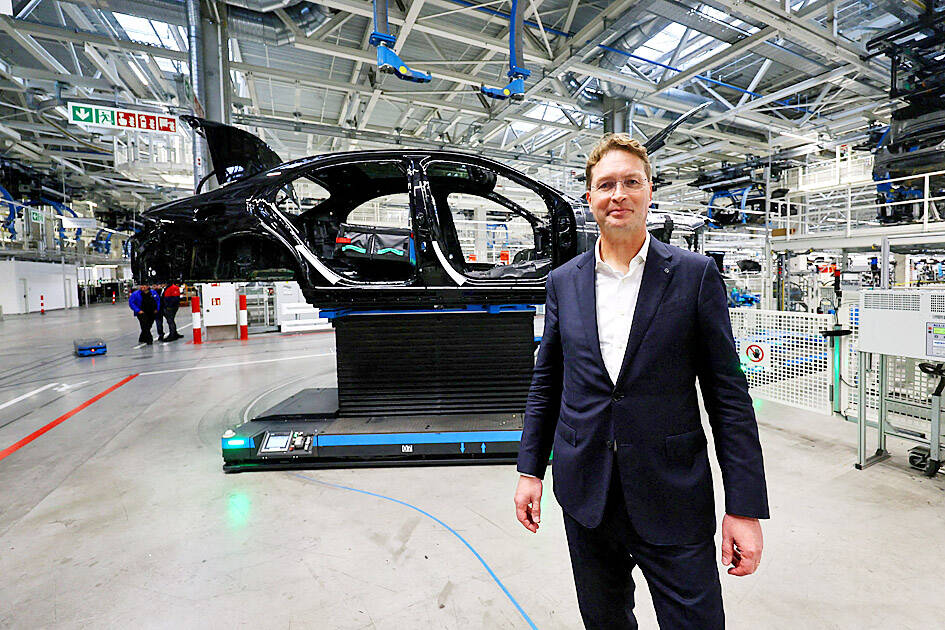Mercedes-Benz Group AG shares yesterday fell the most in four years after a deepening slowdown in China prompted the world’s biggest luxury car maker to cut its outlook.
The stock slid as much as 8.4 percent in Frankfurt, the steepest intraday decline since 2020. Mercedes’ profit warning weighed across the sector, with BMW AG falling 4.4 percent.
The deepening rout in China has particularly hurt sales of Mercedes’ most expensive models like the S-Class and Maybach sedans. The manufacturer cut expectations for its main cars unit and now sees adjusted returns between 7.5 percent and 8.5 percent, compared with a prior forecast of as much as 11 percent. Earnings before interest and taxes would be “significantly below” the prior year level.

Photo: Reuters
Mercedes is planning a sales offensive in China with new products, chief executive officer Ola Kallenius said yesterday.
The profit warning is a setback for Mercedes’ push further upmarket and yet another warning sign for Germany’s marquee industry, which is struggling with a bumpy transition to electric vehicles (EVs) and headwinds in China. Volkswagen AG this month scrapped a decades-old labor pact and might close factories in Germany for the first time due to lagging demand. BMW last week cut its full-year earnings guidance, held back by the China downturn and sluggish EV sales.
The cutbacks undermine Mercedes’ strategy of selling more of its most luxurious vehicles to boost profitability. China’s macroeconomic environment has deteriorated further, driven by the persistent downturn in the real estate sector, the company said.
“China is turning into a nightmare,” Oddo BHF analysts wrote in a note, with risk of yet deeper problems as consumers in the country shift to EVs and away from high-margin S-Classes.
The company’s latest EVs have met with a tepid response from consumers in Asia’s powerhouse economy and elsewhere. Younger drivers in China are increasingly turning to homegrown brands that are perceived to have more advanced in-car digital and entertainment technology.
While business in China is sliding, sales in Europe are also under pressure. Mercedes deliveries across the region slumped 13 percent last month and were down 3 percent during the first eight months. Cratering EV sales are undermining efforts to meet EU emissions rules that would tighten next year, exposing the industry to billions of euros in fines.
German Minister for Economic Affairs and Climate Action Robert Habeck is holding an industry summit in Berlin on Monday to discuss ways out of the current crisis.

MULTIFACETED: A task force has analyzed possible scenarios and created responses to assist domestic industries in dealing with US tariffs, the economics minister said The Executive Yuan is tomorrow to announce countermeasures to US President Donald Trump’s planned reciprocal tariffs, although the details of the plan would not be made public until Monday next week, Minister of Economic Affairs J.W. Kuo (郭智輝) said yesterday. The Cabinet established an economic and trade task force in November last year to deal with US trade and tariff related issues, Kuo told reporters outside the legislature in Taipei. The task force has been analyzing and evaluating all kinds of scenarios to identify suitable responses and determine how best to assist domestic industries in managing the effects of Trump’s tariffs, he

TIGHT-LIPPED: UMC said it had no merger plans at the moment, after Nikkei Asia reported that the firm and GlobalFoundries were considering restarting merger talks United Microelectronics Corp (UMC, 聯電), the world’s No. 4 contract chipmaker, yesterday launched a new US$5 billion 12-inch chip factory in Singapore as part of its latest effort to diversify its manufacturing footprint amid growing geopolitical risks. The new factory, adjacent to UMC’s existing Singapore fab in the Pasir Res Wafer Fab Park, is scheduled to enter volume production next year, utilizing mature 22-nanometer and 28-nanometer process technologies, UMC said in a statement. The company plans to invest US$5 billion during the first phase of the new fab, which would have an installed capacity of 30,000 12-inch wafers per month, it said. The

Taiwan’s official purchasing managers’ index (PMI) last month rose 0.2 percentage points to 54.2, in a second consecutive month of expansion, thanks to front-loading demand intended to avoid potential US tariff hikes, the Chung-Hua Institution for Economic Research (CIER, 中華經濟研究院) said yesterday. While short-term demand appeared robust, uncertainties rose due to US President Donald Trump’s unpredictable trade policy, CIER president Lien Hsien-ming (連賢明) told a news conference in Taipei. Taiwan’s economy this year would be characterized by high-level fluctuations and the volatility would be wilder than most expect, Lien said Demand for electronics, particularly semiconductors, continues to benefit from US technology giants’ effort

‘SWASTICAR’: Tesla CEO Elon Musk’s close association with Donald Trump has prompted opponents to brand him a ‘Nazi’ and resulted in a dramatic drop in sales Demonstrators descended on Tesla Inc dealerships across the US, and in Europe and Canada on Saturday to protest company chief Elon Musk, who has amassed extraordinary power as a top adviser to US President Donald Trump. Waving signs with messages such as “Musk is stealing our money” and “Reclaim our country,” the protests largely took place peacefully following fiery episodes of vandalism on Tesla vehicles, dealerships and other facilities in recent weeks that US officials have denounced as terrorism. Hundreds rallied on Saturday outside the Tesla dealership in Manhattan. Some blasted Musk, the world’s richest man, while others demanded the shuttering of his